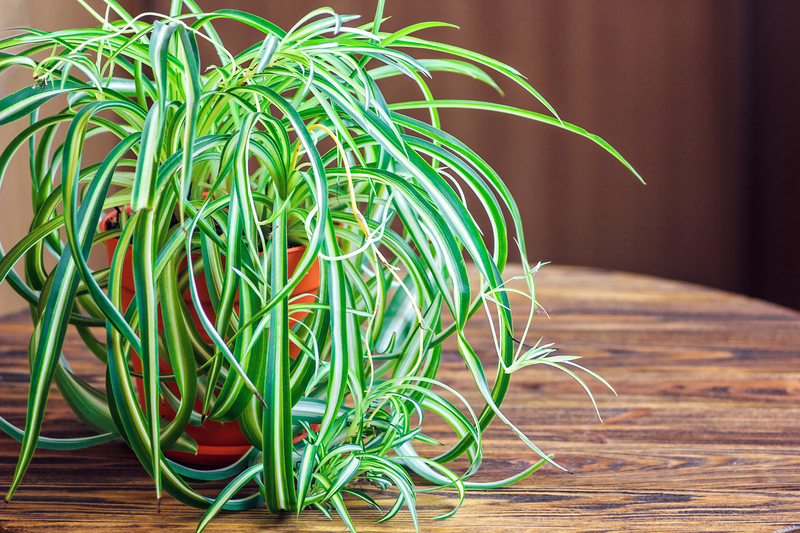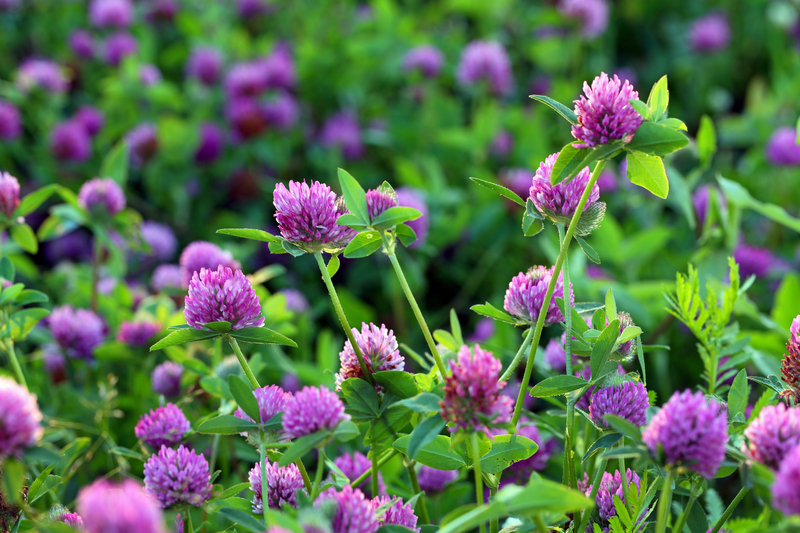Waste Not, Want Not: Enriching Soil Through Organic Recycling
Posted on 24/08/2025
Waste Not, Want Not: Enriching Soil Through Organic Recycling
Soil health is the foundation of sustainable gardening and agriculture. But how can we keep soil fertile naturally, reduce landfill waste, and ensure a greener planet? The answer lies in organic recycling. By recycling organic matter, we can transform waste into a valuable resource--nutrient-rich soil that supports healthy plants and thriving communities. This article delves deep into the techniques, science, and benefits of enriching soil through organic recycling, providing comprehensive guidance for individuals, families, and communities looking to make a positive impact.
What is Organic Recycling?
Organic recycling, also known as composting or recycling of biodegradable materials, refers to the process of converting organic waste--such as food scraps, yard trimmings, and paper--into a useful product: compost. Unlike synthetic fertilizers, compost reintroduces vital nutrients into the soil and improves its structure, moisture retention, and ability to support plant growth.
Why Does Organic Recycling Matter?
- *Reduces landfill waste*: Organic materials break down slowly in landfills, emitting methane--a potent greenhouse gas. Composting diverts this waste.
- *Enriches soil*: Compost provides a natural nutrient boost, leading to healthier plants and higher yields.
- *Improves soil structure*: Compost increases soil's ability to hold moisture and reduces erosion.
- *Promotes sustainable gardening and farming*: Synthetic fertilizers can degrade soil quality over time; compost works in harmony with nature.

Understanding the Science: How Does Organic Recycling Enrich Soil?
Composting is driven by microbial activity. When you add organic waste to a compost pile, bacteria, fungi, worms, and other organisms break down the material. In this process, nutrients like nitrogen, phosphorus, and potassium are released from the waste and made available to plants.
Moreover, compost acts as a soil conditioner, increasing the soil's organic matter and enhancing its ability to retain moisture and nutrients. The result is a healthy, fertile growing medium that benefits virtually any landscape.
Key Elements of Effective Composting
- *Carbon-rich materials (Browns)*: Dry leaves, straw, cardboard, and paper. These provide energy for microbes and help balance moisture.
- *Nitrogen-rich materials (Greens)*: Grass clippings, vegetable scraps, coffee grounds, and manure. These materials aid in microbial growth and speed up decomposition.
- *Water*: Moisture is essential for microbial activity but should not saturate the pile.
- *Air*: Turning and aerating the compost helps prevent odors and ensures efficient decomposition.
Methods of Organic Recycling for Soil Enrichment
There are several organic recycling techniques you can use, whether you have a small balcony or a large backyard. Below are the most popular methods:
1. Traditional Backyard Composting
The most common method, backyard composting, involves collecting organic waste in a pile or bin, managing moisture and aeration, and letting nature take its course. After several months, the waste transforms into dark, crumbly compost.
- Maintain a ratio of about 2:1 browns to greens.
- Turn the pile weekly to introduce oxygen.
- Keep the pile as moist as a wrung-out sponge.
2. Vermicomposting (Worm Composting)
Vermicomposting uses special composting worms, such as red wigglers, to break down food waste much faster. Ideal for indoor use, worm compost bins are compact and efficient.
- Add kitchen scraps (avoid citrus, meat, and dairy).
- Worms create nutrient-rich castings, an excellent soil amendment.
3. Bokashi Composting
Bokashi is a Japanese method using anaerobic fermentation, often in airtight bins. Unlike traditional composting, bokashi can process meat and dairy, converting all kitchen waste into pre-compost, which can then be buried in the garden.
4. Trench Composting
Organic waste is buried directly in the soil, where it decomposes beneath the surface. This low-effort technique is ideal for gardeners looking to improve soil fertility without a compost pile.
5. Mulching
Shredded leaves, grass clippings, or other organic matter are applied as a layer on top of the soil. This not only prevents weed growth and retains moisture but also adds organic content as it breaks down.
What to Compost: A Complete Guide
Understanding what materials are suitable for your compost pile is crucial for success. Here's a comprehensive list:
Compostable Items ("Greens" & "Browns")
- Fruit and vegetable scraps
- Coffee grounds and filters
- Tea bags (ensure they are plastic-free)
- Eggshells
- Grass clippings
- Weeds (avoid seeds)
- Leaves
- Straw and hay
- Shredded newspaper and cardboard
- Sawdust (untreated wood only)
- Human and pet hair
- Wood ash (small amounts)
Materials to Avoid
- Meat, fish, and dairy (unless using bokashi)
- Oily or greasy foods
- Diseased plants
- Glossy or coated paper
- Pet waste (unless hot composted)
- Coal or charcoal ash
- Invasive weeds or seeds
Best Practices for Composting Success
Want to maximize nutrient recycling and get high-quality compost for your garden or landscape? Follow these tips:
- Chop or shred waste before adding it to speed up decomposition.
- Balance the greens and browns to maintain an ideal carbon-to-nitrogen ratio (about 30:1).
- Keep the pile moist but not soggy.
- Turn or aerate the pile regularly to prevent odors and distribute microbes.
- Add a starter such as finished compost or garden soil to introduce beneficial microbes.
- Patience is key: Compost can take anywhere from a few months to a year, depending on the method and materials.
Benefits of Enriching Soil Through Organic Recycling
There are innumerable benefits to integrating organic waste recycling into your daily routine or community efforts:
Improved Soil Fertility
Compost offers a balanced blend of plant nutrients, enhancing the fertility and structure of any soil type. It slowly releases nutrients, ensuring plants can access what they need without the risk of nutrient leaching.
Water Conservation
Soils enriched with compost retain water better, reducing the need for frequent irrigation. This is especially valuable in drought-prone regions.
Disease and Pest Resistance
Healthy soil supports beneficial microbes that outcompete harmful pathogens, leading to stronger, more resilient plants. Additionally, compost can improve plants' resistance to pests and disease.
Environmental Impact
Every bit of organic waste we recycle means less material in landfills and a reduced carbon footprint. Organic recycling contributes to climate change mitigation while enhancing local food production and biodiversity.
Common Challenges and Solutions
New to composting? You might encounter obstacles, but they're easily overcome with a little knowledge:
- Odors: Often due to excess moisture or not enough air; add browns and turn the pile.
- Slow decomposition: The pile may be too dry or lacking nitrogen; add greens and a little water.
- Rodents: Avoid meat, dairy, and fats. Use a covered bin if needed.
- Unwanted seeds/weeds: Ensure compost gets hot enough (at least 140?F/60?C) to kill seeds.
Tips for Community and Urban Organic Recycling
Urban environments pose unique challenges for recycling organic material, but innovative solutions make it possible:
- Participate in local food scrap collection programs.
- Start a community composting initiative at a garden or park.
- Share compost bins with neighbors in apartment blocks.
- Use space-efficient composters like tumbler bins or worm bins on balconies.
- Educate others in your community about the benefits of composting organic waste.
Advanced Techniques: Enhancing Your Compost and Soil
Compost Tea
Compost tea is a liquid fertilizer made by steeping finished compost in water, then applying it to your plants to provide a quick nutrient boost and beneficial microbes. It's an excellent way to multiply the benefits of your compost.
Biochar
Integrating biochar (charcoal produced from organic material) into compost improves its ability to retain nutrients and supports beneficial microbial life. Biochar is also a long-term carbon sequestration tool for soil health.
Crop Rotation & Green Manures
Using cover crops like legumes or clover can further boost soil fertility when incorporated into organic recycling practices. These green manures fix nitrogen in the soil and, when composted, increase organic matter.
Success Stories: Real-Life Impact of Organic Recycling
- Urban gardens thriving on homemade compost, producing nutrient-rich vegetables and flowers.
- Schools reducing their waste footprint by teaching kids about composting and soil health.
- Communities closing the loop by reusing food scraps and yard waste to grow more food for themselves and local food banks.

Future Trends: The Growing Importance of Organic Soil Enrichment
As the world shifts toward sustainability, enriching soil through organic recycling will play an increasingly crucial role. From smart composting systems to citywide food waste diversion, innovation will continue to make composting more accessible, efficient, and impactful. Supporting these efforts not only promotes healthier soils but also healthier communities and generations to come.
Conclusion: Waste Not, Want Not
Enriching soil by recycling organic waste is a simple yet profoundly effective way everyone can contribute to a greener, more sustainable future. By adopting organic soil enrichment techniques--from backyard composting to urban worm bins--you transform waste into a precious resource, reduce your environmental footprint, and nurture healthy plants and communities. Remember: Every apple core, leaf, or coffee ground you compost is a small act of stewardship for our planet.
It is time to join the movement. Don't waste potential--let's enrich our soil through organic recycling, together!
Latest Posts
Revitalize Your Home with Vertical Gardening
Defensive Planting: Overcoming Wind in Your Outdoor Space
Rooting for Beginners: 9 Essential Gardening Insights
Transform Your Landscape with Unique Hedge Trimming Techniques

